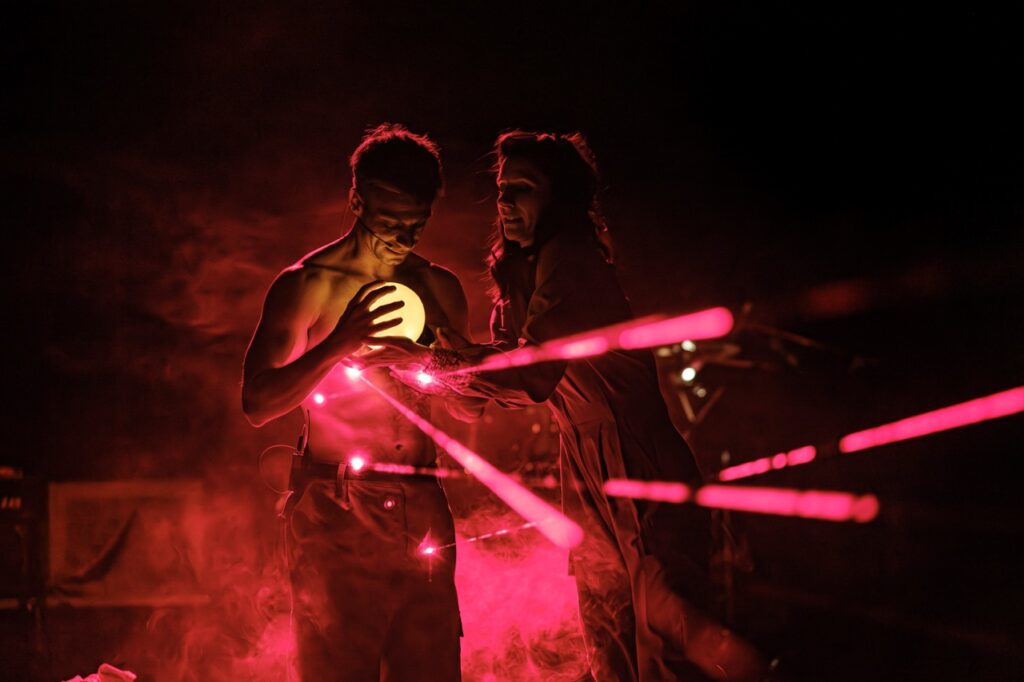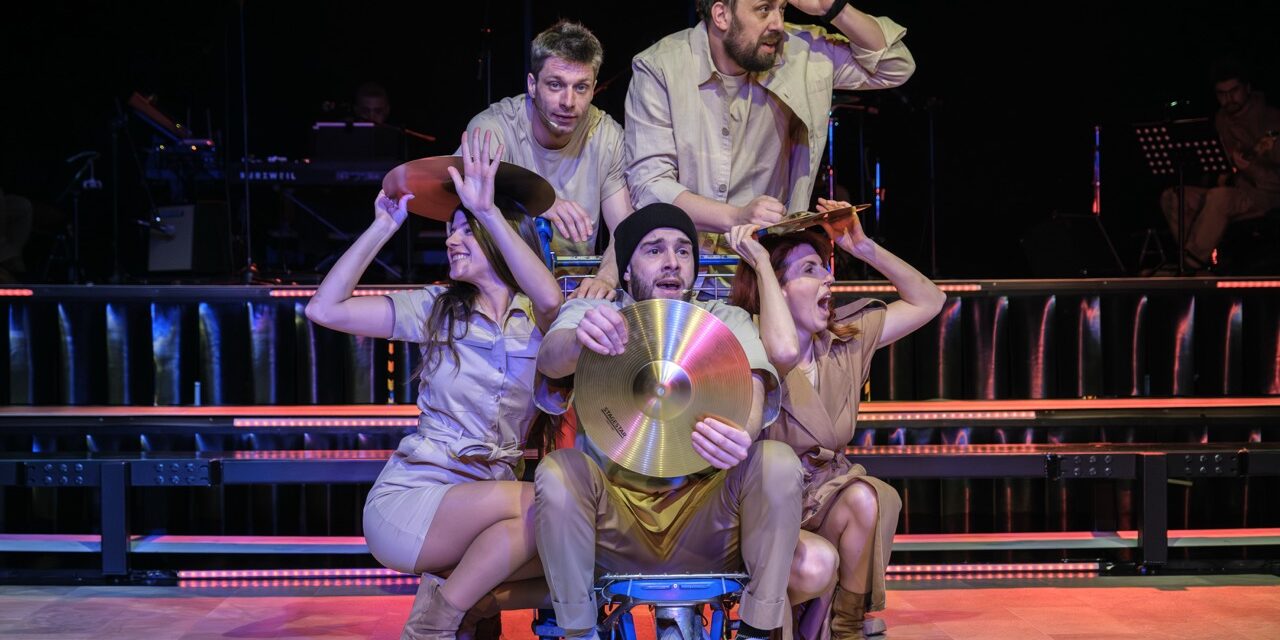Chamber Theatre 55, presented as part of the 65th International Theatre Festival MESS in Sarajevo
There are two kinds of spectators who come to see Blank at the Chamber Theatre 55 in Sarajevo: those who have read Feđa Štukan’s autobiography, and those who will.
For the first group, it’s easy to recognize the pivotal moments of the novel that offer an unflinching insight into the life and work of one of Bosnia and Herzegovina’s most prominent actors: from his childhood in Sarajevo, through the Bosnian War, exile in Berlin, addiction, personal crises, and redemption, to his ongoing confrontation with political, religious, social, and moral questions. The second group, on the other hand—those who must rely solely on the stage adaptation to grasp the turbulence of this life story—might find it hard to keep track of what’s happening in front of them. Not because the story is strikingly complex, but because of Kokan Mladenović’s dramaturgical and directorial approach, which is based on fragmentation, performative alienation, and unsubtle product placement—the latter of which treats the audience like a target group of book buyers, turning curious spectators into potential consumers.
The title Blank itself refers to something “bare,” as in a “blank piece of paper” or even a tabula rasa. Since its release in 2019, Štukan’s debut memoir has become an “absolute bestseller,” as critics freely describe it, and has been translated into several languages, including Chinese, Russian, and Hungarian. Both economically and culturally, it lends itself well to a stage adaptation. Kokan Mladenović is the first to dramatize and direct the life story, focusing on key themes such as drug addiction, exile, and music and theatre as a safe haven.
The narrative framework of the dramatization is set at Belgrade’s Nikola Tesla Airport, where a real incident occurred a few years ago: Feđa Štukan was prohibited from entering the country due to a “negative assessment of the security risk”. In the play, this event is presented as an interrogation. Two security officers—one played by Alen Muratović in a military-beige trench coat, the other by the band’s drummer, Aldin Omerović—bombard Štukan with various insults and accusations. They label him a “Muslim extremist,” a “criminal,” and a “traitor.” But all of this bounces off his chest, having no effect on him; not a single muscle twitches beneath his black sunglasses as he stands proudly on the proscenium, wearing his own merchandise: Blank in white letters printed on black cotton, mirroring the book cover itself.

Blank, Chamber 55
Around this interrogation revolves a fragmentary and monodramatic adaptation of the original novel. Several actors and actresses perform as Štukan, embodying different phases of his life and, therefore, it seems, all the different personalities one character can bear within himself. The directorial formula is simple, yet misleading: one speaks (or sings, or raps) while the rest of the ensemble performs. The choreography, arranged by Amila Terzimehić, ranges from simple, repetitive movements and gestural motifs to moments of almost explosive physical expression, oscillating between restraint and release. Elements of hip-hop, breakdance, and free dance also appear throughout. Rather than serving as commentary or contrast to the monologues, in Blank, dance functions as a dynamic form of mise-en-scène that—not always, but often—has little to do with the context of the scene itself. By doing so, Kokan Mladenović’s directorial style adds even more discontinuity to the already fragmented dramaturgy of the play, making it hermeneutically dense—if not entirely closed off.
The cast is about fifteen people strong, not counting the live band seated at the back of the stage. Although the sheer number of performers might suggest Blank to be an ensemble piece, it ultimately revolves around one person only. One of the actors portraying Štukan is Davor Golubović, whose energy is at a maximum, forcing the audience to engage with him and sustaining an electric tension throughout the scene. Praise also belongs to several cast members whose utterly comedic performances bring lightness and laughter to the audience. Anja Kraljević, as the beauty pageant contestant and girlfriend, proves to be wonderfully self-ironic, delivering lines of accidental wisdom such as “Be the best version of yourself” or “Build bridges, not wars.” Elma Juković, as the Berlin girlfriend Betty, both sings and raps in flawless German, turning her scenes into brief yet memorable bursts of musical theatre.
One of the most striking moments is the final scene. After a cathartic experience (which shall remain unnamed to avoid spoilers), Feđa Štukan—who has been sitting in the back throughout the performance—strides to the proscenium once more. This time, he is not there to endure the accusations and insults of the flight security personnel, but to perform Frank Sinatra’s My Way, while a handful of children, one wearing a Blank merch T-shirt, enter the stage on the moving walkway. Each holds a copy of Blank, folding the paperback edition into a paper heart held high, their faces beaming with oversized smiles, as if the play has suddenly transformed into a TV commercial. With this finale, Štukan’s life becomes a brand story, optimized for emotional engagement metrics. And just like that, the spectator becomes a consumer. Those in the audience who do not yet own a copy of the bestseller are reminded to purchase one.
At the 65th International Festival MESS in Sarajevo, the jury awarded Kokan Mladenović the Golden Laurel Wreath for “Best Director.” The production of Blank also received the “Sound of Sarajevo” award from Radio Sarajevo. Nevertheless, throughout the performance, spectators left the dusty pink auditorium of the Chamber Theatre 55 several times. Their expressions were difficult to read, and the reasons for their departures remain open to interpretation—just as the director likely intended for the opaque production itself.
Credits
Director and adaptation: Kokan Mladenović//Author of original novel: Feđa Štukan//Dramaturg: Vedran Fajković//Choreographer: Amila Terzimehić//Set design: Adisa Vatreš Selimović//Costume design: Aleksandra Pecić Mladenović// Stage manager: Bojana Jagličić
Music by Feđa Štukan and band, Aldin Omerović, Ismar Žalica, Vedran Fajković
Performed by Feđa Štukan, Maja Izetbegović, Sabit Sejdinović, Davor Golubović, Dina Mušanović, Senad Alihodžić, Amar Selimović, Enes Kozličić, Anja Kraljević, Nadine Mičić, Aldin Omerović, Alen Muratović, Merima Ovčina, Elma Juković, Sin Kurt
Further reading: interview with Kokan Mladenović: “We have to reinvent the theatre of our times”
For more information, visit: kamerniteatar55.ba/
Berina Musa is a writer, dramaturg, and critic based in Sarajevo and Freiburg. She studied German linguistics, literary studies, and art history at the University of Freiburg and is currently completing a second degree in dramaturgy at the Academy of Performing Arts in Sarajevo. Her plays and short films have been presented at the Bosnian National Theatre Zenica, MESS, the Sarajevo Film Festival, and the Mostra Internazionale del Nuovo Cinema di Pesaro.








